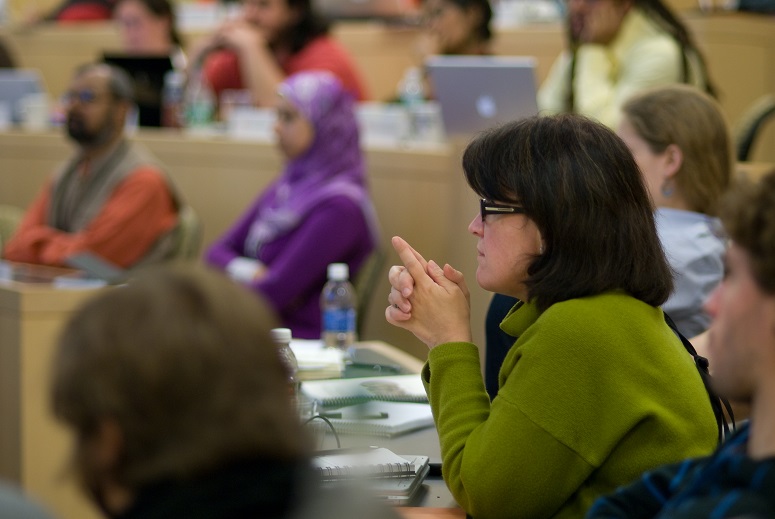2019-20 Call for Curriculum Fellowships
 THIS CALL IS CLOSED – VIEW THE 2019-2020 CURRICULUM FELLOWS
THIS CALL IS CLOSED – VIEW THE 2019-2020 CURRICULUM FELLOWS
These fellowships are offered in three formats:
1. Classroom-based
2. Online
3. Hybrid (combination of online and classroom based).
Each curriculum fellow (unless it is a joint course) will receive a stipend of $1,300 and additional support/resources from ICNC. If fellows apply as a team of instructors, they will split the stipend.
Selected ICNC Curriculum Fellows are expected to teach their courses either in Summer or Fall 2019 or Winter, Spring, or Summer 2020.
As part of our mission as an educational foundation, ICNC promotes the teaching of civil resistance in academic institutions and beyond, whether through classroom-based, online, or hybrid courses. We’ve been offering these fellowships since 2014 to instructors from all over the world. To learn more about the history of these fellowships and to see past curriculum fellows, please click here.
ICNC Curriculum Fellows have come from all over the world. You can click here to view an interactive map of previous ICNC Curriculum Fellows.
Why Teach Civil Resistance?
What is civil resistance and why does it matter for your students?
“Civil Resistance is an extra-institutional conflict-waging strategy in which organized grassroots movements use various, strategically sequenced, and planned out, nonviolent tactics such as strikes, boycotts, marches, demonstrations, noncooperation, self-organizing and constructive resistance to fight perceived injustice without the threat or use of violence.” — Veronique Dudouet, Powering to Peace: Integrated Civil Resistance and Peacebuilding Strategies
“Although the impact of civil resistance on domestic and international politics across the globe is often pivotal, we know relatively little about the dynamics of nonviolent struggle.” — Kurt Schock, Civil Resistance Today
Civil resistance education is emerging as an important element of the college-level educational experience, with a growing number of courses on civil resistance offered at various universities. As an interdisciplinary topic, civil resistance intersects various academic disciplines: politics, history, sociology, social-psychology, international relations, and peace and justice studies. A specialized course on civil resistance can offer students knowledge and skills that are relevant to advanced studies in the social sciences.
At the same time, students who may be interested in careers in foreign policy, government, community organizing, or civil society organizations can find a course on civil resistance to be a career-oriented learning opportunity. As nonviolent civil resistance movements increasingly shape international affairs and domestic politics in countries around the world, government and civic actors, as well as journalists, are increasingly likely to encounter this phenomenon in their work. In such cases, knowledge about civil resistance movements can constitute an additional career advantage. Such a course may also enhance the students’ skills and commitment to be active citizens in their communities.
Eligibility & Award and Program Details
- Scholars, and instructors from colleges and universities around the world who are interested in expanding their institutions’ existing curriculum to cover civil resistance, and
- Adult educators and trainers who might work in civil society organizations, but have academic-based training or pedagogical and teaching experience, particularly working in regions and countries with restrictive civic spaces or conflicts.
- Educators who do not currently teach civil resistance at the institutions where they want to develop the new curriculum unit. We also prefer that the institutions currently have no courses on civil resistance offered as part of the departmental, school, or university curriculum.
- The curriculum fellowship is designed to plant a seed for continued education on civil resistance. Applicants should therefore be able to demonstrate that their curriculum is part of a long-term, sustainable teaching plan, as opposed to being a one-off course offering.
Award and Program Details:
- 2019-20 ICNC Curriculum Fellows are expected to teach their courses either in Summer or Fall 2019 or Winter, Spring, or Summer 2020.
- ICNC stipends for the fellowship are $1,300. If proposing as a team of instructors, the stipend will be split among the instructors.
- In addition to the stipend, ICNC provides staff support and educational resources free of charge to curriculum fellows.
- Prospective applicants can choose to develop and apply for one among three types of courses that our curriculum fellowship supports:
- classroom-based courses
- online courses
- hybrid (online/classroom) courses
Classroom-Based Curriculum Fellowship
Applicants for ICNC’s classroom-based curriculum fellowship are expected to develop a curriculum for a full term course on civil resistance or a shorter unit on civil resistance that, at minimum, covers five 90-minute sessions over the course of minimum of 5 weeks as part of the undergraduate or graduate course. The course should offer students a full course guide with learning objectives, themed modules, relevant readings, exercises, or simulations directly relevant to the field of civil resistance. Each accepted proposal for a full course or at least a five week unit on civil resistance (taught individually or co-taught with another instructor) will be supported with the ICNC stipend of $1,300.
In addition to a curriculum fellowship grant, awardees will receive staff support and consulting around curriculum planning and a package with academic books and documentaries on civil resistance. ICNC provides these resources free of charge as part of its curriculum fellowship package to help its fellows develop the content on and teach civil resistance.
Online Curriculum Fellowship
Applicants for ICNC’s online curriculum fellowship are expected to develop either a full-term online course or a curriculum unit on civil resistance that, at minimum, consists of a minimum of 5 weekly online sessions on civil resistance in which participants are asked to review relevant session notes, videos, and readings and then engage in forum discussions moderated by a seminar instructor.
Fellows will be expected to set up and offer their online teaching on civil resistance through the ICNC Online Courses platform unless this would violate your institution’s policies.
Hybrid Curriculum Fellowship
Applicants for ICNC’s hybrid curriculum fellowship are expected to develop and teach full term course on civil resistance combining a significant amount of both classroom-based and online learning, or a curriculum unit on civil resistance that consists of at least 5 weeks of focus on civil resistance that includes regular online work each week and a minimum of one or two face-to- face sessions during each five weeks of the course devoted to civil resistance. In this hybrid of classroom and online learning, students should be able will to review relevant session notes, videos, and readings and then engage in classroom activities and forum discussions moderated by the instructor.
Fellows will also be expected to set up and offer the online portion of the course on civil resistance through the ICNC Online Courses platform, unless prohibited by your institution’s policies.
